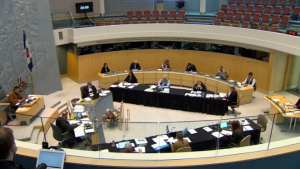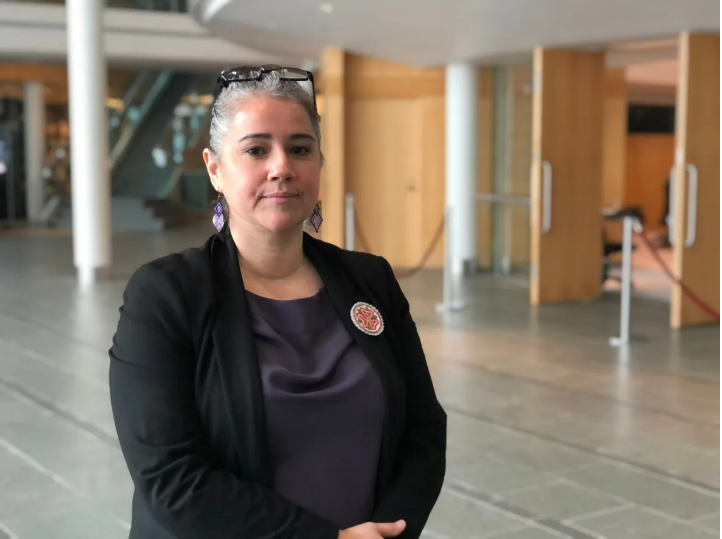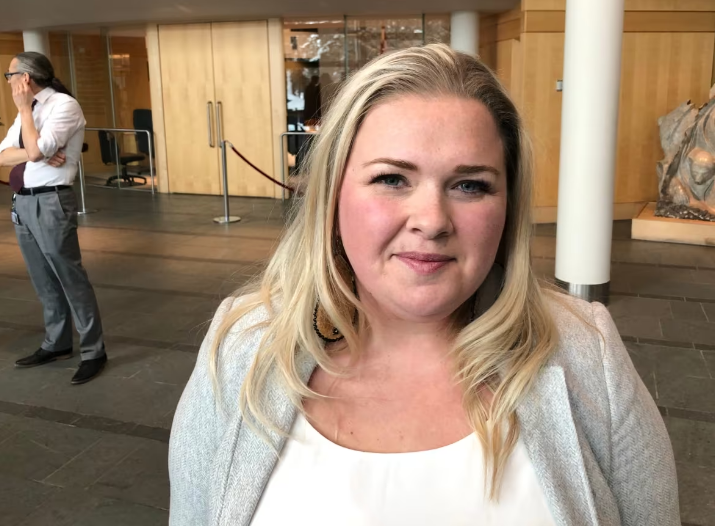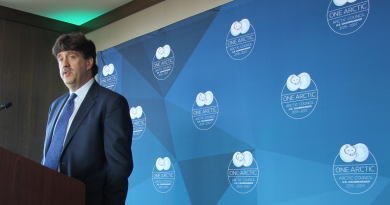N.W.T. MLAs say they won’t support territorial carbon tax bill as is

N.W.T. MLAs said Wednesday they could not support the finance minister’s proposed changes to the territory’s carbon tax system as it’s currently written.
Bill 60, which would change the territory’s Petroleum Products and Carbon Tax Act, is the N.W.T. government’s answer to incoming federal increases on carbon pollution.
Finance Minister Caroline Wawzonek introduced it as a “made-in-the-North” approach that would allow the territory more freedom in designing the carbon tax rebate system and more flexibility to adjust how the carbon tax is applied. The alternative would be to scrap the N.W.T.’s legislation in favour of a federal version.
MLAs on the standing committee on government operations said it’s not clear why the territory’s proposed legislation is better than the federal one.
“Overall, committee does not see a benefit to passing Bill 60 compared with the alternative of the federal backstop,” said committee chair Rylund Johnson, the MLA for Yellowknife North.
“The government has not provided committee, or the public, with enough information to show that its approach is better.”
Johnson said the finance department told the committee its bill could improve the tax burden for small mines and mines nearing closure, but for everyone else, it would be the same as the federal system.
He said the department couldn’t provide a comparison to show how the two systems would impact cost of living, because the department said it doesn’t know how the federal government would return revenues to northerners under the federal system.
“This missing information from the department made it hard for the committee to assess which approach is better for the N.W.T. and to identify ways to improve either approach,” Johnson said.
Too much consideration for large emitters
Lesa Semmler, one of the committee’s deputy chairs and the MLA for Inuvik Twin Lakes, said the committee found the territorial government’s approach to the bill problematic.
She said by the territory’s own admission, the department’s public consultation focused on large emitters.

Caitlin Cleveland, another deputy chair on the committee and MLA for Kam Lake, said the government should spend more of the revenues it collects from offsets on community governments, Indigenous governments, businesses and non-government organizations (NGOs).
Cleveland said the N.W.T.’s rebate approach allocates too much to large emitters and to its own revenues.
Cleveland pointed to a projection from the finance department in November. She said the department expects to collect about $63 million in carbon tax revenues for the 2023-24 fiscal year, and allocate $47 million of that as offsets.
Over half of the offsets, about $24 million, are slated for large emitters. The remaining $16 million, about 25 per cent of the revenues, will go into general revenues.
“Committee is disappointed the government is not using more of these funds to soften the cost of living impacts of the tax,” she said.
Cleveland added the government isn’t providing rebates to community governments, Indigenous governments, most businesses or NGOs.

“The rationale provided by government that retail businesses can simply pass along the carbon tax to customers, that businesses will be eligible for GNWT energy savings programs, and that NGOs can adjust is not accepted by committee,” she said.
Recommendations
The MLAs looked to the other territories, which have both agreed to implement the federal carbon tax system.
Cleveland pointed to Yukon’s approach, which applies the federal system while designing its own rebate program for communities.
She said Yukon provides its municipal governments with 3.5 per cent of its carbon tax revenues.
That amount more than compensates for the approximately 2.6 per cent of the carbon tax that its local governments pay.
If the N.W.T. provided 3.5 per cent of its rebates to community governments, they would receive $2.2 million, Cleveland said.
She acknowledged Wawzonek did propose a new community offset grant, but said the grant would only amount to about $1 million and is unlikely to fully offset the increased costs.
The committee is recommending that the government compensate communities for their increased carbon tax payments.
It’s specifically recommending that the territory provide $2.2 million in community funding in the 2023-24 fiscal year and increase that figure proportional to future increases in carbon tax rates.
The standing committee also recommends the government press the federal government to recognize the circumstances of the North in its approach to fighting climate change.
That includes more funding to make renewable energy options accessible and affordable, Semmler said.
She said since many northern communities rely on diesel for electricity and often natural gas or propane for heat, the North has few alternatives to fossil fuels.
That means many northerners will have to pay the higher costs, but the new legislation will have minimal effect on reducing emissions.
She recommended Premier Caroline Cochrane convey this in a letter to the Prime Minister and request a reply.
Johnson, the committee’s chair, said the committee’s recommendations will be discussed in committee of the whole, but wasn’t sure when those discussions would take place.
Related stories from around the North:
Canada: MLAs in Canada’s Northwest Territories to hear from public on carbon tax changes, CBC News
Greenland: Climate change accelerating ice loss from peripheral glaciers, Eye on the Arctic
Norway: Will the green transition be the new economic motor in the Arctic?, Eye on the Arctic
Russia: More Russian Arctic oil via Murmansk redirects to India, The Independent Barents Observer
Sweden: Sweden’s climate policies closer to reaching goals, Radio Sweden
United States: Bering Sea ice at lowest extent in at least 5,500 years, study says, Alaska Public Media



